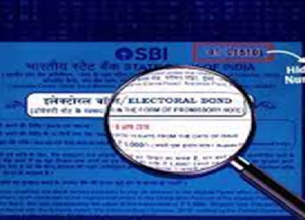ELECTORAL BONDS
02, Nov 2019

Prelims level : Election & Electoral Returns
Mains level : GS-II Government policies and Interventions for development in Various Sectors and Issues arising out of their design and Implementation.
Why in News?
- Association for Democratic Reform has recently stated that electoral bonds worth Rs.232 crore was sold since past October.
About Electoral Bonds:
- An electoral bond is designed to be a bearer instrument like a Promissory Note — in effect, it will be similar to a bank note that is payable to the bearer on demand and free of interest.
- It can be purchased by any citizen of India or a body incorporated in India.
- The electoral bonds will not bear the name of the donor. In essence, the donor and the party details will be available with the bank, but the political party might not be aware of who the donor is.The intention is to ensure that all the donations made to a party will be accounted for in the balance sheets without exposing the donor details to the public.
Eligibility of a Political Party:
- Every party that is registered under section 29A of the Representation of the Peoples Act, 1951 (43 of 1951) and has secured at least one per cent of the votes polled in the most recent Lok Sabha or State election has been allotted a verified account by the Election Commission of India. Electoral bond transactions can be made only via this account.
Other facts regarding Electoral Bonds:
- The bonds have been issued in multiples of Rs.1,000, Rs.10,000, Rs.1 lakh, Rs.10 lakh and Rs.1 crore and have been available at specified branches of State Bank of India.
- They can be bought by the donor with a KYC-compliant account. Donors can donate the bonds to their party of choice which can then be cashed in via the party’s verified account within 15 days.
- The bonds will be available for purchase for a period of 10 days each in the beginning of every quarter, i.e. in January, April, July and October as specified by the Central Government.
- An additional period of 30 days shall be specified by the Central Government in the year of Lok Sabha elections.
- Donations will be tax deductible, and the benefitting political party will get a tax exemption for the amount received.
Do private companies are eligible for Electoral Bonds?
- Prior to 2017, as per Section 182 of the Companies Act, 2013, a company can donate only up to 7.5% of its average profit of the last three years, and must disclose this amount and the beneficiary political party.
- Now, through the electoral bonds, there is no limit to the amount companies can donate, and the requirement for such firms to have existed for the last three years on a profit-making basis has also been deleted.
Whether foreign companies are eligible for Electoral Bonds?
- The amended Companies Act now allows any foreign company registered in India to make contributions through bonds to political parties, subject to legitimate doubts about who or where its real owners are, or what its source of funding is.
About ADR:
- The Association for Democratic Reforms (ADR) is an Indian non-partisan, non-governmental organization which works in the area of electoral and political reforms.
- Along with National Election Watch (NEW), ADR is striving to bring transparency and accountability in Indian politics and reducing the influence of money and muscle power in elections.
- In the last few years, based on ADR’s report and data, a huge number of coverage was received in print and online media.







